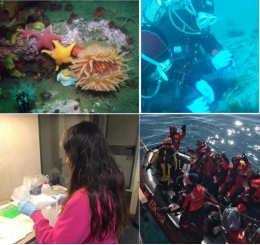Project Challenge: studying human impact and natural hazards threatening Antarctic marine ecosystems
The Antarctic Peninsula —from Adelaide Island to Hope Bay, the South Shetland Islands and Elephant Island— is the marine study region of the second Challenge scientific campaign, which began in January and is directed by Professor Conxita Ávila, from the Faculty of Biology and the Institute for Research on Biodiversity (IRBio) of the University of Barcelona.
During this austral summer, the second Challenge campaign in Antarctic latitudes will contribute to improving knowledge of the marine biology and ecology of these extreme ecosystems, increasingly threatened by the impact of global change and critical to the ecological balance of the entire planet.
Until 7 March, the team will extend the lines of study initiated in previous projects to the Antarctic. It will open new avenues of research to analyse changes in ecological interactions; assess transformations in biodiversity; experimentally determine acidification and biomineralisation; quantify marine litter —especially plastics— in the water column, sediment and benthic invertebrates; and integrate the links between the various agents related to environmental change into the study.
"Challenge aims to analyse and describe experimentally the human pressures and natural hazards that challenge the Antarctic marine benthos. With this aim, we want to determine how factors such as rising temperatures or ocean acidification affect selected benthic organisms; how changes in ecological interactions and chemical ecology are affected, as well as symbiosis, diseases, or the appearance of invasive species", notes Professor Conxita Ávila, from the UB Department of Evolutionary Biology, Ecology and Environmental Sciences.
With the support of the oceanographic research vessel BIO-Hespérides, the team will make several diving trips to study the Antarctic benthos —the organisms that live on the seafloor—, collect samples and carry out experimental studies on the scientific equipment in situ. It is also planned to use an unmanned remotely operated underwater vehicle (ROV) and apply various techniques —such as trawl sampling of the ocean surface or manta trawl— to study the characteristics of Antarctic ecosystems.
The integration of the results of the Challenge project into the previous general knowledge about the Antarctic Peninsula and nearby areas will generate a huge set of data and information that will be useful for the international scientific community. In this context, the application of the Good Environmental Status (GES) assessment will allow the establishment of a system of indicators to present an operational definition of GES for this Antarctic area. This will provide a tool of potential interest for assessing possible additional activities on the Antarctic continent. The campaigns led by Professor Ávila in Antarctic regions —Ecoquim, Actiquim, Distantcom and Bluebio— have contributed to outlining a more detailed map of biodiversity in extreme ecosystems, with the discovery of new species of marine invertebrates and the identification of products of marine origin with potential interest in pharmacology, among other contributions.
The Challenge project includes the collaboration of teams from the company NO-LOGO Project, the Center for Advanced Studies of Blanes (CEAB-CSIC), the University of Cadiz, the Institute of Biomolecular Chemistry (ICB-CNR) and the Anton Dohrn Zoological Station (SZN) in Italy, the University of the Republic (Uruguay), the University of Duisburg-Essen (Germany) and the Underwater Unit of the Mossos d'Esquadra de Catalunya (Catalan police force).
Source: PressUB
